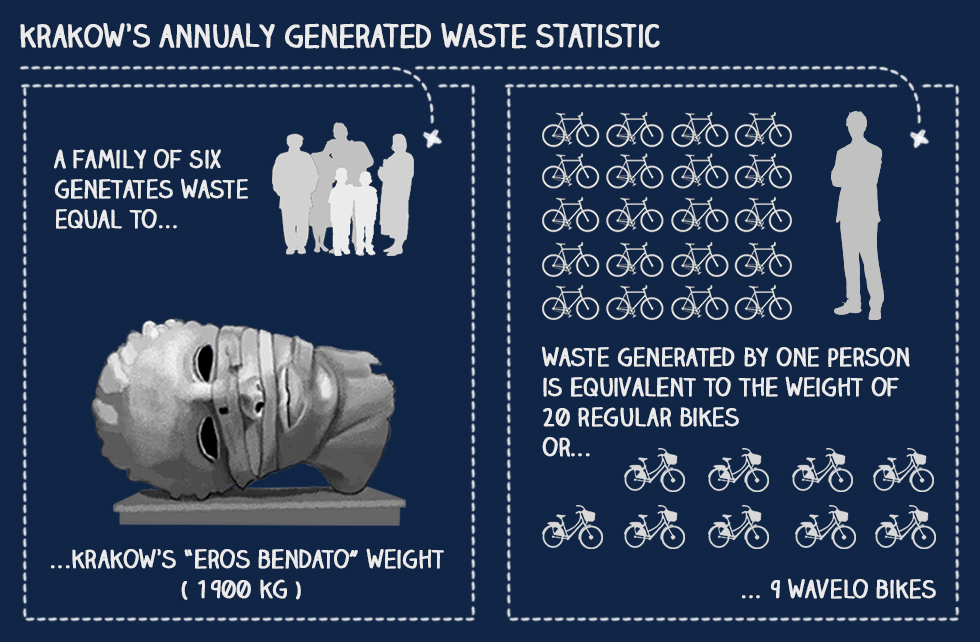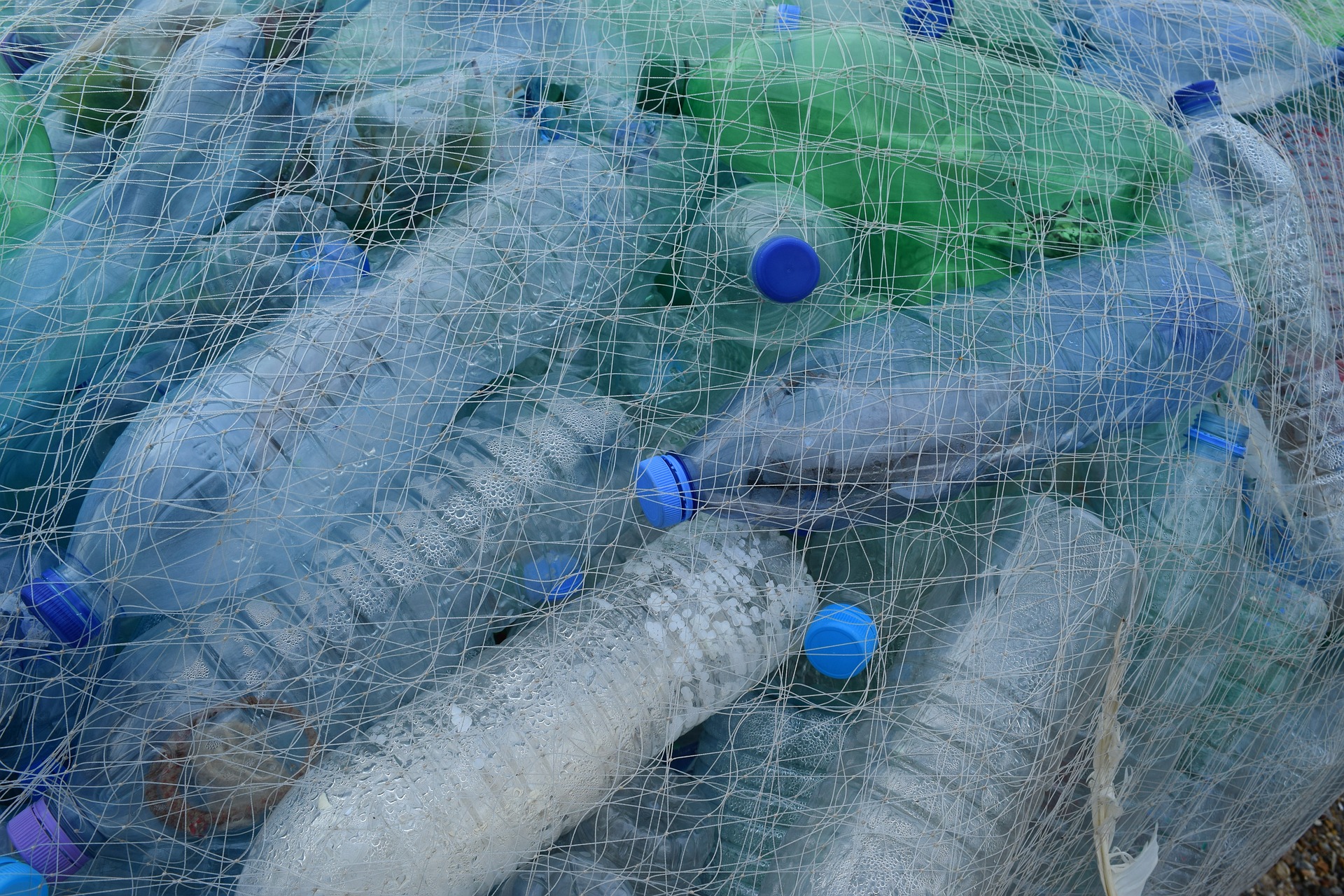Reducing your waste in Krakow is easier than ever

Waste by the numbers
In Poland, the average amount of collected municipal waste per person is 303 kg annually. Only around 77 kg of this is sorted, the Central Statistical Office reports.
For the Krakow urban community, the City Council reports that officially registered total of 206,191.04 tons of unsorted (mixed) municipal waste, 114,648.19 t of sorted waste was delivered to Regional Municipal Waste Treatment Facilities by MPO (Krakow’s waste management agency) in 2016. The overall quantity of waste collected for year 2016 was 320,839.22 t. That gives around 320 kg per capita (including tourists and unregistered residents).

Waste types
Most of us are familiar with regular recycling containers and know the general rules (and if you don’t, see the graphic above!), but what about more problematic cases such as electronic devices, medicines, or textiles?
The waste electrical and electronic equipment collection can be ordered via the Elektrobrygada call center (+48 801 084 084). The “Electrobrigade” workers will take unwanted electronic equipment from your doorstep for free at the accorded date and time.
MPO in collaboration with PCK (Polish Red Cross) coordinates 100% korzyści (100% of benefit) program of free textiles collection. By ordering this service you make sure that PCK workers will make good use of the waste since they distribute those textiles to people in difficult situations. What you can give away: clothes, hats, bedclothes, towels, scarves, curtains, shoes, gloves, and other textile goods.
Expired drugs are considered a hazardous waste and require a different disposal method. The easiest way is to find a pharmacy on a list of pharmacies that facilitate a special container for expired medicines.
The second method is to deliver them to one of the Points of Selective Waste Collection (PSZOK). The PSZOK points accept every kind of problematic waste, recycled materials, batteries, paints and varnishes, bulky waste, rubble, tyres etc. The Lamusownia point is located at Nowohucka 1d and is open from Monday till Friday 10 am – 6 pm and on Saturday 7:30 am – 15:30 pm; a second one, PGOW – Barycz on Krzemieniecka 40, is open from Monday till Friday 6:30 am – 6 pm and on Saturday 6:30 am – 2 pm.

Reducing waste
Recycling is just one step to improving the general waste flow. There’s still non-recyclable and non-biodegradable waste produced in large quantities every year. Avoiding this kind of products is a foundation of Zero Waste lifestyle trend. The Polish Zero Waste Association promotes reducing garbage on a daily basis by means of the 5R, five essential rules: refuse (unnecessary items such as fliers, single-use products), reduce (lead a minimalistic lifestyle), reuse (give a second life to products), recycle (separate waste and upcycle), and rot (produce homemade ecological fertilizers). The Association also mentions additional “R”s: repair (instead of buying new product) and remember (to always make informed choices). In this spirit, these are some zero waste tips for begginers:
Use reusable bottles
One million (est.) plastic bottles are used per minute. The simplest solution is a reusable bottle, available with filters for tap water and made of non-toxic materials.
Shop with cloth bags
Around 160 thousand plastic bags are produced every second. Multi-use cotton bags are the best alternative to plastic bags. It’s just a question of habit to pack a set of them every time you’re going shopping. You can even upcycle your old clothes by making handmade bags.
Avoid single-use packages
Buying products in bulk or in potentially multi-use containers (instead of products wrapped in plastic at the supermarket) helps avoiding unwanted package waste. Or just buy fresh products at one of Krakow’s several farmers’ markets, like Stary Kleparz, Nowy Kleparz, or Hala Targowa.
If you’re interested in finding local inspiration, tips, and support, you can join the Zero Waste Krakow Facebook group.

Local initiatives
The Polish Zero Waste Association and Oddam Odpady started an initiative called #zwłasnymkubkiem (with my own cup) to promote buying take-out coffee in your own reusable cups. Oddam Odpady has even developed a map of coffee shops that allow this practice.
Oddam Odpady also shares other useful maps such as those for expired drug disposal points, open urban composters, foodsharing points, and PSZOKs (Point of Selective Waste Collection).
Another initiative closely linked to waste reduction is Wawelska Kooperatywa Spożywcza (the Wawel Food Cooperative), a collective that buys products directly from eco-friendly producers and local farmers without trade intermediaries, focuses on reducing unnecessary packages, and cares about the quality of products (the majority of partners have organic cultivation certificates). Delivered goods are distributed among members of the cooperative once a week, which also allows package reduction.
Foodsharing points – Krakow already has two of them. One is located on Dolnych Młynów 10 and the second in Spółdzielnia Ogniwo on Paulińska 28, I floor. Not only private individuals drop by to share their excess food; also local bakeries and retailers eagerly deliver their unsold but still fresh products.
As the European Commission points out, reducing food waste is not only a moral and environmental issue. It also helps to save money. Here are some more tips on how to limit food waste in our households.


Why have I seen so many times in Krakow that the waste collectors just throw all the selected materials (paper, glass and plastic) in the waste collecting truck? It doesn’t seem that they recycle.